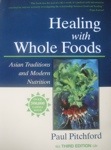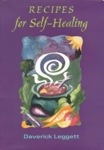Food
The provision of food is a basic human need. Many cultures have realised that what food is eaten, how it is prepared and how it is eaten has a powerful effect on our health. The Chinese, with their insights into Qi and the subtle energetic workings of the body, have set out clearly how various foods affect different organs. They have determined how our diet may be changed to counter the effects of climate, time of day, lifestyle and so forth.
The preparation of food for ourselves and our loved ones is one of the oldest traditions of humankind. It is intimately linked with our health and how we interrelate with our relatives and friends. How food is prepared, cooked and eaten has an important role to play in health.
This is recognised by Chinese medicine where it is not only the type of food which is seen to be important but also its energy. This is a consequence of the view that energy underlies all existence. Therefore, the particular energy of each food is a key factor as well as its preparation and cooking, both of which can change this energy. Today we also have to take into account factors such as processing and intensive agricultural methods which adulterate food and reduce its ability to nourish us.
In China itself, people may be given prescriptions for a certain food or meal which they then take to an adjoining restaurant. This prepares the meal in the way specified by the prescription and is eaten to improve health. There is no such ‘health-food’ restaurant in the West but it shows the relationship which may exist between our diet and our health. Treating illness by means of diet has a long history in Chinese medicine and was described in the Yellow Emperor’s Inner Classic (Huang Di Neijing) written about 300 BC.
Further resources
Healing with Wholefoods by Paul Pitchford is an excellent guide to food and how we can eat to be healthy. Uses the guiding principles of Chinese medical theory.
Recipes for Self-Healing by Daverick Leggatt gives practical advice and recipes for food we can eat to balance and strengthen us. Again, this information is rooted in the wisdom of traditional Chinese medicine.
General principles
Try to eat warm food, regularly and fresh food.
Eat plenty of:
Root veg
Green leafy veg
Beetroot
Rice/oats
Use spelt instead of wheat
Some meat is fine – fish/chicken is better than too much red meat
Fresh root ginger, fennel and cardamom are all very beneficial for the digestion. Take as teas or use in cooking particularly soups and stir fries.
Try to avoid cow’s milk and cow’s milk products – this tends to be sticky and hard to digest. Pasteurized milk is more difficult than raw milk
Alternatively, use non-animal milks such as almond, soya, oat or rice milk. Goat’s milk is preferable to cow’s milk.
Also, cheese and yoghourt made from sheep’s or goat’s milk is preferable to those from cow’s milk.
Careful with!
Sugar
Greasy food (which includes cow’s milk products)
Coffee, chocolate
Oranges, rhubarb – these fruits tend to be a little acidic for most of us
If you know your blood group, it is worth thinking about following a diet which is suited to your individual blood type – group O, A, B or AB.
Dr Peter D’Adamo published a book some years ago – Eat Right For Your Blood Type. Everyone I have seen who has followed their Blood type diet has found it helpful.


